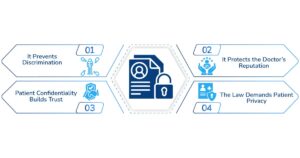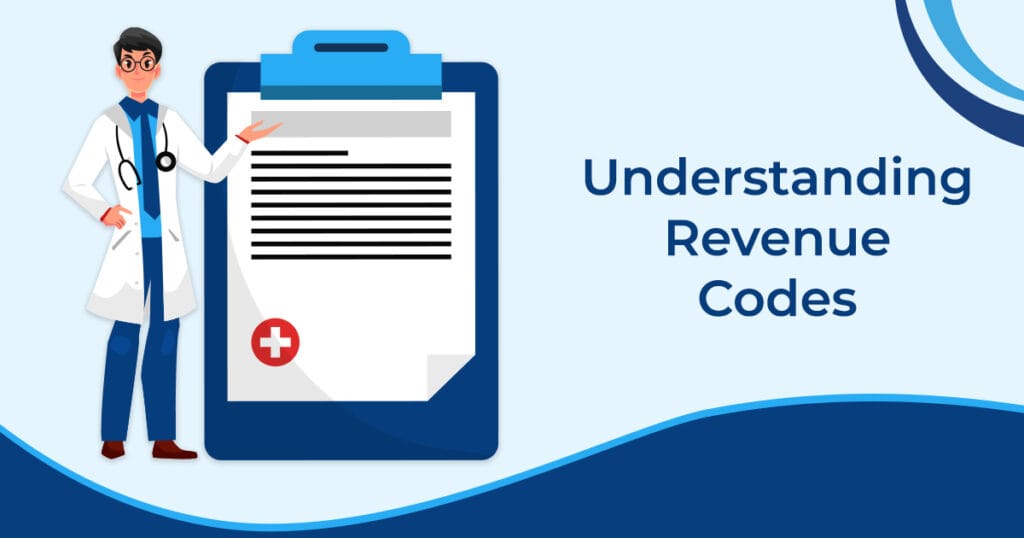In today’s world, patient information must be kept secret and private. The rules governing the protection of patient confidentiality ensure the secrecy of personal medical details from those who should not be privy to them. Strong security measures, such as locks on digital files and regular checks for problems, will help keep patient information safe.
Similarly, it would help them show that they care for patients and can be trusted because of such rules. Keeping patient information safe safeguards the patient and helps the healthcare provider maintain a good reputation at the same time. Here, we’ll discuss confidentiality in healthcare, its importance, and security system.
What Is Confidentiality in Healthcare?
Patient confidentiality focuses on obtaining permission from patients. It is vital to clarify how their information will be used and shared, gather and store only relevant data, and protect their privacy. Data reduction is critical to safeguarding a patient’s information.
Gathering just the necessary information to deliver secure healthcare services. Finally, secure methods such as encryption must be utilized in conjunction with access control measures. It provides further protection for confidential records on a specific individual’s health status. Thus, suitable security mechanisms must be used to keep the document secret and secure to protect its content. If you know more about medical billing and its related terms, contact us at MAVA Care.
Importance of Privacy and Confidentiality in Healthcare
Respect for the patient’s right to privacy and confidentiality are fundamental principles of ethical healthcare practice. This ensures that the patient feels comfortable with the provider when sharing their information. Privacy refers to the protection of an individual’s information or data and ensuring that the data is only released when permitted. Unauthorized access to this private and confidential document is strictly prohibited.
Additionally, in a healthcare context, this is useful in preventing patient discrimination, stigma, or embarrassment. More specifically when receiving treatment from healthcare providers. The focus is on the notion that patients will always offer honest information about their health and current status if they are confident to a third party.
Thus, privacy is similar to confidentiality. It means that health information and records belong to the patient. The healthcare provider is legally and ethically required to protect the information from further dissemination. By maintaining a private and confidential nature, healthcare systems ensure people’s reliance on their institutions. It gains fair access to healthcare services and avoids compromising ethical standards in medical billing services.
Privacy Security and Confidentiality in Healthcare
Privacy, security, and confidentiality can be defined as the main pillars of ethical and efficient healthcare models. It protects individual data and develops trust among patients.
1. Privacy in Healthcare
The ability of a person to determine who has access to their PHI and how it is used. In the context of health care, clinical privacy means ensuring that personal details. It includes a patient’s history, diagnosis, or treatment are disclosed to only the right people. Patient privacy is essential in developing rapport, and proper communication is vital to attending to the patient’s needs and arriving at a diagnosis.
2. Security in Healthcare
Security relates to the ways and means by which the data of the patients could be as well be safe, and protected from intruders, violation, and other cyber risks. These are, for instance, adequate information technology structures and protections, and the use of encryption. It secures networks and the use of protocols that guard against leaks of data.
3. Confidentiality in Healthcare
Confidentiality is the ethical and legal obligation of healthcare providers to keep patient information private. They share it only for legitimate purposes, such as treatment, payment, or healthcare operations. Confidentiality fosters trust and aligns with laws like HIPAA, which mandates safeguarding sensitive health information.
Why Is Confidentiality Important in Healthcare?
In the future, you may not want to disclose crucial details about your state to your medical team. Either of those choices can interfere with your care, alter your outcome, and sometimes endanger others. It might be useful for providers to know the path of a disease and how persons might be affected, especially in the middle of a health crisis.

1. It Prevents Discrimination
In work or life, one does not want to be defined by diseases, illnesses, or chronic ailments that one has. The idea of personal life remaining personal prevents employers, schools, housing directors, and community centers. Moreover, it also prevents other organizations from discriminating against you based on the possible or lack of illness. Lack of knowledge results in having wrong perceptions of certain illnesses. And their fears and negative stereotypes can affect you negatively.
2. It Protects the Doctor’s Reputation
Would you be able to refer a doctor who let you down? Would you recommend this doctor either on the internet or to your friends or colleagues? You certainly wouldn’t. On the other hand, you would suggest a doctor who respects the patient’s privacy. Trust forms relationships and relationships form a reputation. If doctors can be believed, they can cultivate good relations with their patients. At the same time, protect their images, not only before their patients but also before other mental health practitioners.
3. Patient Confidentiality Builds Trust
In healthcare, especially, trust is a critical component, and the rumors leak all that and more. When you allow the patients to come through for their sicknesses, they are more willing to present themselves to a doctor. It occurs when you offer them a safe place to go for treatment and if they are more willing to explain their symptoms.
4. The Law Demands Patient Privacy
Maintaining patient information as a secret is not only right, it is also legal. The Health Insurance Portability and Accountability Act has a section called The Privacy Rule that makes healthcare workers legally unable to disclose information. These are about the patient’s mental or physical condition. The care they received, the payment made for that care, or any personal identification numbers such as social security numbers. Breaking the HIPAA law attracts severe fines or even imprisonment apart from loss of job and reputation.
Doctor-Patient Confidentiality
Privacy of medical information is one of the most important fundamental principles of healthcare making patients comfortable to speak with their physicians. It leads to a trusting relationship, where the patient is quite willing to talk about areas of their mood, symptoms, and past medical history. Lack of such trust makes patients conceal information that can affect their diagnosis and treatment. However, the operational principle of confidentiality is not limited to oral information only.
Healthcare professionals should also make sure those records are safely kept and only available to certain people. Thus, sometimes doctors may feel compelled by the law to break patient confidentiality regardless of the consequences. It may be for the patient or other persons at large. Nevertheless, the general right to privacy is an important factor in health care. Thus, underlining the highest aspiration of healthcare givers to protect their patients’ rights.
Final Thoughts
Patient information privacy is important for healthcare workers. It’s a legal requirement and a key part of providing good care. This study will examine what healthcare workers know and think about keeping patient information confidential in a resource-limited environment.
Moreover, the study aims to improve patient privacy protection in this setting by understanding their knowledge, attitudes, and any challenges they face. The study’s findings can help ensure that patient’s information is kept safe and secure, even in places with fewer resources available. For more information about medical billing terms, reach out to us at MAVA Care.
FAQ’s
What is confidentiality in NHS?
Privacy in the NHS means that personal health information should remain private and cannot be disclosed to anyone who does not need to know unless the patient has consented to it. This is a legal requirement and a professional NHS code of conduct that respects patients’ rights to privacy and maintains their confidence in healthcare services.
How to maintain confidentiality in healthcare?
Record storage, passwords, and encryption protect patient information. Information disclosure is limited to those who require it, and patient information is not discussed over the phone or in places where others can overhear it. Staff should also receive a confidentiality refresher at least once a year. They should also review Data Protection Act guidelines and ensure that all waste containing any form of identification has been shredded.
Why is it important to maintain confidentiality?
Respecting the patient’s information is a cornerstone when creating trust between the healthcare provider and their client to allow the client to disclose information that might be important in treatment. It also respects patient’s rights to dignity, privacy, and autonomy besides meeting legal and ethical requirements, and reduces the risk of harm from disclosure of patients’ information.
How to explain confidentiality?
Confidentiality is the ethical and often legal obligation to protect private information shared with you by keeping it secure and not disclosing it to unauthorized parties. It’s crucial in many professional settings, such as healthcare, law, and business, where trust and privacy are essential for maintaining relationships and complying with regulations.
What are the principles of confidentiality?
The key principles of confidentiality include respecting privacy, obtaining informed consent, maintaining secure information storage, limiting access to authorized personnel, and only sharing information on a need-to-know basis. These principles also encompass proper data disposal, clear policies on breaches, and understanding when disclosure is legally required or permitted.









